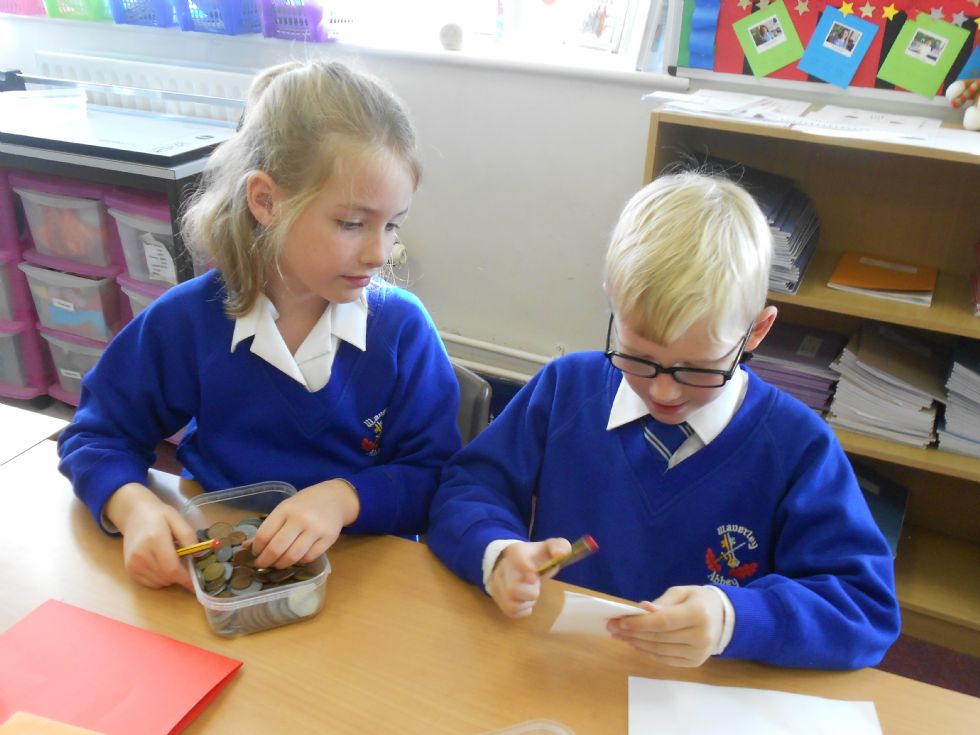Mathematics
All things are possible for one who believes – Mark 9:23
At Waverley Abbey, we want all children to be confident, capable and enthusiastic learners who are passionate about mathematics. Through a positive and caring environment, we provide the opportunity for all pupils to reach their full potential with a wide range of learning experiences across all areas of the subject.
In mathematics, we want to empower our pupils by gifting them with the ability to think, learn, reason, problem-solve, persist and experiment – all life skills for the future. We strive to give pupils the ability to function with independence and autonomy in Maths and are there to support them on their journey.
Once pupils have achieved this mathematical fluency, we seek to embed and deepen their understanding by developing their reasoning and problem solving skills. This will be facilitated using activities designed to provoke mathematical thinking through:
- Conjecture
- Discussion
- Evidence
- Explanation
- Exploration
- Generalisation
- Justification
- Linking areas of knowledge
- Observation
Curriculum Intent:
- Provide children with a foundation for understanding number, reasoning, thinking logically and problem solving with resilience so that they are fully prepared for the future.
- All children will maximise their academic achievement and enjoy maths
- Lessons which are enjoyable and challenging
- Change mindset where they feel comfortable to take risks and make mistakes in order to learn.
- Create inquisitive minds.
Curriculum Implementation:
- Teachers have a secure understanding of the curriculum and subject area.
- Short term plans supported by different resources – adapted to meet the needs of the children – provide bespoke teaching
- Use assessment and prior knowledge to know the areas to focus on.
- Engaging lessons.
- Emphasis on maths talk and pupil engagement.
- Follow a CPA approach.
- Children are invested in their learning – self assessing.
Our objectives for teaching mathematics.
- To develop positive attitudes towards mathematics and give children a sense of achievement.
- To promote enjoyment and enthusiasm for learning through practical activity, exploration and discussion.
- To gain confidence and competence with numbers and the number system.
- To develop a range of strategies for solving mental calculations, written calculations and word problems.
- To stimulate a natural curiosity to ask questions, explore patterns and explain/justify their reasoning through discussion with a partner or the whole group.
- To develop the ability to solve problems through decision making and logical thinking.
- To stretch every child, no matter what ability, to reach their full potential in maths
- To give opportunities for children to work co-operatively.
- To understand the importance of mathematics in everyday life.
A 50 minute maths lesson takes place daily for all pupils. At Waverley Abbey, our most able mathematicians are taught together in an ‘Express Set’ which may not necessarily be their regular class teacher. The remaining children in each year group are taught in ‘Parallel Sets’ of mixed ability by the rest of the teachers within that year group. All maths groups cover the statutory content as set out by the National Curriculum, it is the pace and learning style which differ.
In our current Year 3, 4, 5 & 6, we have an additional teacher who teaches maths to a smaller group of children from their particular year group.
Outisde of school, maths learning is supported through the use of MyMaths and Times Table Rock Stars. Homework is set through the MyMaths website and children are encouraged to practise their times tables several times weekly by using the Times Table Rock Stars website.
Our Approach to Calculation
Mental Calculations
The ability to calculate mentally lies at the heart of numeracy. At Waverley Abbey, we believe that it is essential to emphasise mental methods throughout the school, with regular opportunities for all pupils to develop the different skills involved. Great importance is placed upon the learning of tables and number bonds as these underpin all other number work.
These skills include:
- Remembering number facts and recalling them without hesitation;
- Using the facts that are known by heart to figure out new facts.
- Understanding and using the relationships between the ‘four rules’ to work out answers and check results.
- Drawing on a repertoire of mental strategies to work out calculations.
- We believe that number bonds and tables facts are the building blocks of mathematics. When these facts are committed to memory and used on an everyday basis they allow pupils to have the confidence and understanding to move on to more complex methods of calculation.
Informal Jottings
As pupils progress to working with larger numbers they will learn more sophisticated mental methods and tackle more complex problems. At this stage, it can be hard for pupils to hold all the steps of a calculation in their heads and so informal pencil and paper notes become part of their mental strategies. These personal jottings are an important stage in getting the right answer and acquiring fluency in mental calculation.
Standard Written Methods
For each operation, at least one standard written method is taught in the later primary years but the progression towards these methods is crucial, since they are based on steps which are done mentally and which need to be secured first.
Please find below the calculation policies for each operation and an overview of the content taught in each year group as per the National Curriculum.
Curriculum Impact:
- Children demonstrate quick recall of facts and procedures. This includes the recollection of the times tables.
- Children have the flexibility and fluidity to move between different contexts and representations of mathematics.
- Children have the ability to recognise relationships and make connections in mathematics.
- Children show confidence in believing that they will achieve.
- Children show a high level of pride in the presentation and understanding of the work
If you would like to find out more about the curriculum please make an appointment to see your child's teacher who will be happy to discuss this with you, you can do this by contacting school through the office via - info@waverley-abbey.surrey.sch.uk

